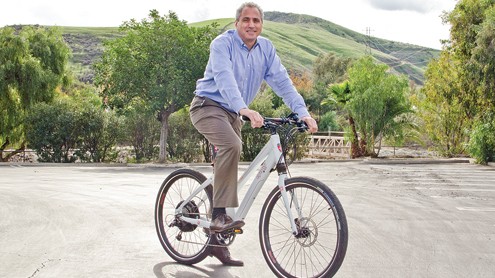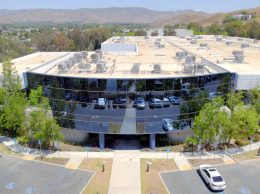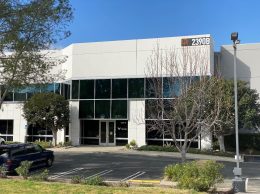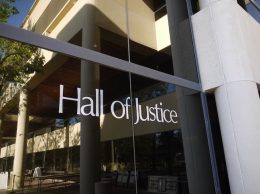Making the grade: Currie offers power assist to hill-challenged bicycle riders

Currie Technologies President Larry Pizzi. The Simi Valley-based company makes electric hybrid bicycles that give the rider varying degrees of power assist or a full throttle. (Alex Drysdale photo)
Uncounted numbers of bicycles are gathering dust in garages, most likely because their owners are too challenged by the hills in their neighborhood.
Currie Technologies, a company that moved to Simi Valley at the end of November, is growing at a robust pace by offering an alternative that saves energy costs while improving health and fitness. Its electric hybrid bicycles, or e-bikes, give the rider varying degrees of power assist or a full throttle when needed.
“All of our e-bikes have dual modality,” Currie President Larry Pizzi said in an interview at the company’s 55,000-square-foot facility on Royal Avenue. “You can either operate them with a throttle and not pedal at all or use them in pedal assist mode. As the price points go higher, the technology that handles the pedal assist modality increases — it gets better.”
The bikes range in price from $600 to $4,000, with an average selling price between $2,000 and $2,500, he said. Rechargeable battery packs are built into the frames or mounted on a rack above the rear wheel.
Pizzi said one of the company’s main challenges is exposing more people to the product.
On the lower priced bikes, a speed sensor reads whether the rider is pushing on the pedals and gradually adds an electrical assist. “As you are pedaling, it feels like someone is giving you a nice little push from behind,” Pizzi said. “. . . And you can increase or decrease the level of pedal assist, or if you want more when you get to a hill, you just grab the throttle and boost it up to full power.”
The higher priced bikes have a sensing device that measures how much torque is being applied to the pedals. Electronics add a proportionate boost to human power. “Suddenly you’re Greg LeMond,” Pizzi said. “It really does make you feel quite powerful, especially in climbing hills.”
The range of the bikes varies with the size of the battery pack and motor, but averages between 15 and 30 miles, Pizzi said. A high-capacity battery designed for Los Angeles Police Department e-bikes lasts eight hours on a charge.
The higher powered e-bikes are equipped with hydraulic disc brakes, and some have regenerative braking that sends a charge to the battery pack when the brakes are applied.
When gasoline prices spike, as they did in the fall to nearly $5 a gallon, the company sees a surge in sales, Pizzi said. The bikes are most suited for trips around town, to the post office or grocery store, he said. For recreational use, they are especially helpful to older adults who have given up getting on a conventional bike because of physical issues.
Currie’s sales of e-bikes and power-assisted scooters are growing at a rate of 20 percent a year, Pizzi said. He expects growth to become exponential somewhere down the road as concern rises over the use of fossil fuels, bicycle infrastructure continues to improve and more bicycle shops add e-bikes to the mix.
The electric bikes are sold primarily through dealerships devoted exclusively to that market. A low-priced line of eZIP bikes and scooters is offered on the websites of Amazon, Target and Walmart.
Currie, with about 45 employees, moved to Simi Valley from Chatsworth at the end of November. Pizzi said the landlord remodeled the space to Currie’s specifications.
The bikes are manufactured in China and Taiwan and shipped to the Simi Valley plant. Each one is pulled out of the box, tuned and quality checked, and repacked for shipping, Pizzi said. Other workers handle customer service and dealer calls, warranty inquiries and product development.
Pizzi said Simi Valley’s mountain views and open surroundings were a factor in the move from Chatsworth.
“Being an outdoor, recreation kind of a product, we like to be in an environment that our associates can enjoy the product in that kind of environment,” he said.
The core technology for the electric bikes was invented by Malcom Currie, who founded the company in 1997 with Richard Mayer. Currie is the former chairman and CEO of Hughes Aircraft Corp. and past CEO and president of Delco Electronics. He retired in 2005 and handed the reins of the e-bike firm to Pizzi.
In January, Currie Technologies was acquired by Accell Group, a Dutch firm that is the largest e-bike company in Western Europe and one of the largest bicycle companies in that market. The deal gave Currie access to financial resources that it never had before, Pizzi said. Since it closed, Currie has opened a retail store in Santa Monica and put five regional territory managers on the road in vans carrying a fleet of demonstration bikes.
“We are the largest e-bike company in North America from a revenue and a unit volume perspective, probably because we have been around the longest,” Pizzi said. Currie’s sales are primarily in the United States, but it also has foreign distributors in markets outside of Western Europe.
Surprisingly, only about 10 percent of the bicycle shops in the United States sell e-bikes, Pizzi said. One reason is that they cost three or four times more than a conventional bicycle, and it takes a considerable investment to stock an assortment of product. Another is that owners and workers at bicycle shops are often passionate riders themselves, and the idea of adding a motor and battery pack to a bicycle is counterintuitive to them.
“We have to get them to experience the category,” Pizzi said, “for them to really say hey, that’s pretty cool.”











